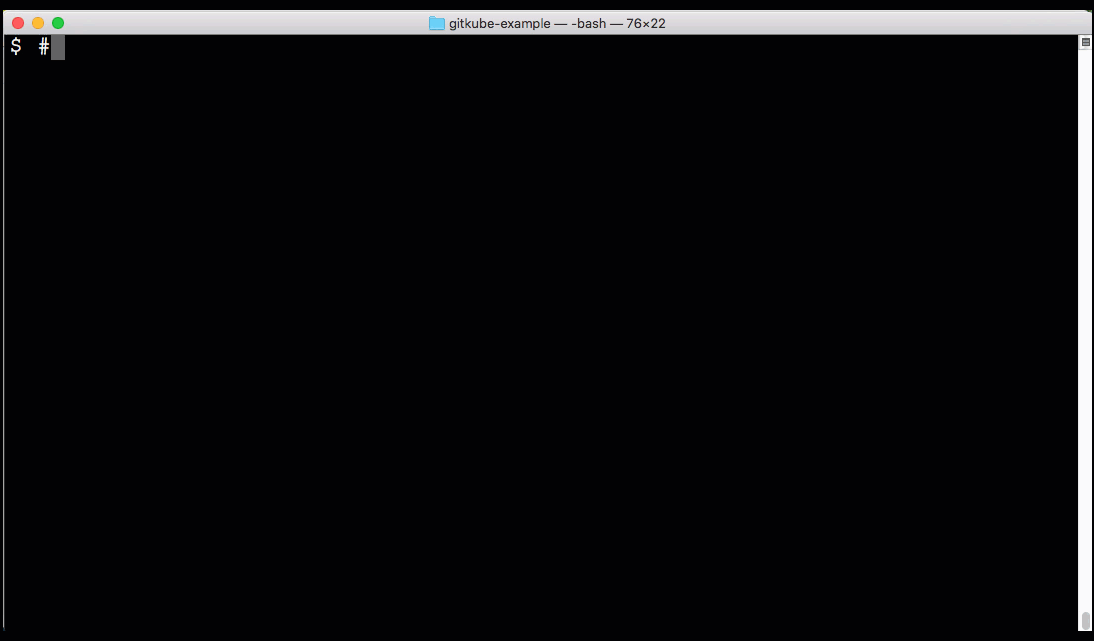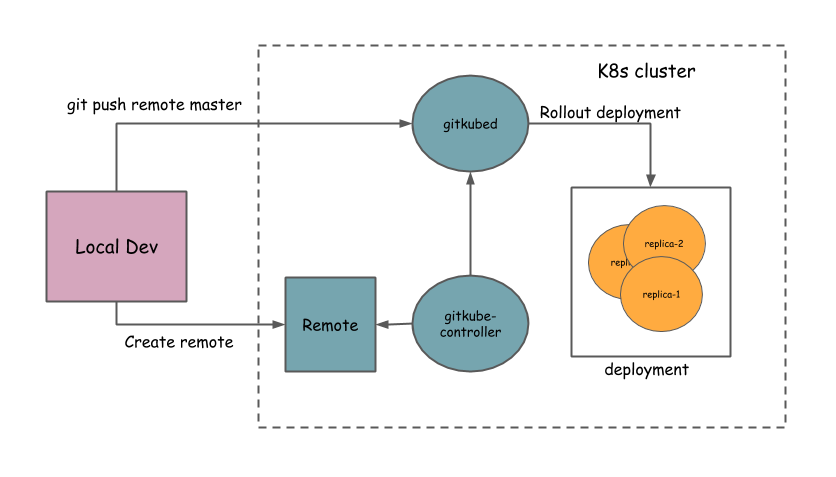https://github.com/hasura/gitkube
Build and deploy docker images to Kubernetes using git push
https://github.com/hasura/gitkube
ci-cd continuous-deployment developer-tools docker git golang k8s kubernetes
Last synced: 9 months ago
JSON representation
Build and deploy docker images to Kubernetes using git push
- Host: GitHub
- URL: https://github.com/hasura/gitkube
- Owner: hasura
- License: apache-2.0
- Created: 2018-03-08T06:25:53.000Z (almost 8 years ago)
- Default Branch: master
- Last Pushed: 2023-08-31T07:48:24.000Z (over 2 years ago)
- Last Synced: 2025-04-06T13:08:02.359Z (11 months ago)
- Topics: ci-cd, continuous-deployment, developer-tools, docker, git, golang, k8s, kubernetes
- Language: Go
- Homepage:
- Size: 35.5 MB
- Stars: 3,814
- Watchers: 97
- Forks: 208
- Open Issues: 44
-
Metadata Files:
- Readme: README.md
- Changelog: CHANGELOG.md
- Contributing: CONTRIBUTING.md
- License: LICENSE
- Code of conduct: code-of-conduct.md
Awesome Lists containing this project
- awesome-hacking-lists - hasura/gitkube - Build and deploy docker images to Kubernetes using git push (Go)
- awesome - gitkube - Build and deploy docker images to Kubernetes using git push (Go)
- awesome-list-docker - gitkube
- awesome-docker - gitkube - Gitkube is a tool for building and deploying docker images on Kubernetes using `git push`. By [@Hasura](https://github.com/hasura/). (Container Operations / Deployment and Infrastructure)
- awesome-docker - gitkube - Gitkube is a tool for building and deploying docker images on Kubernetes using `git push`. By [@Hasura](https://github.com/hasura/). (Container Operations / Deployment and Infrastructure)
- awesome-starred - hasura/gitkube - Build and deploy docker images to Kubernetes using git push (golang)
- jimsghstars - hasura/gitkube - Build and deploy docker images to Kubernetes using git push (Go)
- awesome-docker - gitkube - Gitkube is a tool for building and deploying docker images on Kubernetes using `git push`. By [@Hasura](https://github.com/hasura/). (Container Operations / Deployment and Infrastructure)
- fucking-awesome-docker - gitkube - Gitkube is a tool for building and deploying docker images on Kubernetes using `git push`. By <b><code> ?⭐</code></b> <b><code> ?🍴</code></b> [@Hasura](https://github.com/hasura/)). (Container Operations / Deployment and Infrastructure)
- awesome-repositories - hasura/gitkube - Build and deploy docker images to Kubernetes using git push (Go)
- awesome-cloud-native - gitkube - Gitkube: Build and deploy docker images to Kubernetes using git push. (Continuous Delivery & GitOps)
- awesome-kubernetes-configuration-management - gitkube
README

# Gitkube
Gitkube is a tool for building and deploying Docker images on Kubernetes using `git push`.
After a simple initial setup, users can simply keep `git push`-ing their repos to build and deploy to Kubernetes automatically.
[](https://godoc.org/github.com/hasura/gitkube)

## When should I use gitkube?
1. Ideal for development where you can push your WIP branch to the cluster to test.
2. Reference implementation for writing git-based automation on your server. Fork this repo and create your own CRD + controller + git remote hook that can do things on the Kubernetes cluster.
## Features:
- No dependencies except native tooling (git, kubectl)
- Plug and play installation
- Simple public key based authentication
- RBAC ready - Control access to git remotes using RBAC
- Support for namespace based multi-tenancy - Remotes can only deploy to their own namespace
- No assumptions about repository structure
## Getting started
Gitkube will run on any Kubernetes vendor/distribution AS IS. In case you find any difficulties in the setup, please comment on [#33](https://github.com/hasura/gitkube/issues/33)
#### Install gitkube
##### Using kubectl
```sh
kubectl create -f https://raw.githubusercontent.com/hasura/gitkube/master/manifests/gitkube-setup.yaml
#expose gitkubed service
kubectl --namespace kube-system expose deployment gitkubed --type=LoadBalancer --name=gitkubed
```
##### Using gitkube CLI (DEPRECATED)
1. Install Gitkube CLI:
- Linux/MacOS
``` bash
curl https://raw.githubusercontent.com/hasura/gitkube/master/gimme.sh | bash
```
- Windows (using [scoop](https://scoop.sh))
```bat
scoop install gitkube
```
Or download the latest [release](https://github.com/hasura/gitkube/releases) and add it to your `PATH`.
2. Use Gitkube CLI to install Gitkube on the cluster:
```bash
gitkube install
```
## Workflow
- Local dev: User creates a base git repo for the application with Dockerfile and K8s deployment
- Setting Remote: User defines a spec for Remote containing the rules for `git push`
- Deploying application: Once a Remote is setup, application can be deployed to K8s using `git push master`
### Local dev
User should have a git repo with source code and a Dockerfile. User should also create a base K8s deployment for the application.
### Setting Remote
A Remote resource consists of 3 parts:
1. authorizedKeys: List of ssh-keys for authorizing `git push`.
2. registry: Details of docker registry where images are pushed post-build.
3. deployments: Spec for building docker image and updating corresponding K8s deployment.
Here is a typical spec for a Remote:
```yaml
apiVersion: gitkube.sh/v1alpha1
kind: Remote
metadata:
name: sampleremote
namespace: default
spec:
# Insert ssh-keys for allowing users to git push
authorizedKeys:
- "ssh-rsa your-ssh-public-key"
# Provide registry details: https://github.com/hasura/gitkube/blob/master/docs/registry.md
registry:
url: "docker.io/user"
credentials:
secretRef: regsecret # Name of docker-registry secret
# Define deployment rules
deployments:
- name: www # Name of K8s deployment which is updated on git push
containers:
- name: www # Name of container in the deployment which is built during git push
path: example/www # Docker build context path in the git repo
dockerfile: example/www/Dockerfile # Location of Dockerfile for the source code
```
### Deploying application
Once a Remote is created, it gets a git remote URL which you can find in its `status` spec
```sh
$ kubectl get remote sampleremote -o yaml
...
status:
remoteUrl: ssh://default-sampleremote@35.225.226.96/~/git/default-sampleremote
remoteUrlDesc: ""
```
Add the generated `remoteUrl` in git
```sh
$ git remote add sampleremote ssh://default-sampleremote@35.225.226.96/~/git/default-sampleremote
```
And finally, `git push`
```sh
$ git push sampleremote master
```
### More examples
Follow this [example](https://github.com/hasura/gitkube-example) repo for more workflows with gitkube.
## How it works
Gitkube has three components:
1. Remote: Custom resource defined by a K8s CRD
2. gitkube-controller: Controller that manages Remote objects and propogates changes to gitkubed
3. gitkubed: Git host that builds docker image from the repo and rolls out deployment
### High-level architecture

## Contributing
Gitkube is an open source project licensed under Apache License 2.0
Contributions are welcome.
## Community and Support
- Join the [Gitkube channel](https://kubernetes.slack.com/messages/CA68R8ZBN/) in the Kubernetes Slack group
## Maintainers
This project has come out of the work at [hasura.io](https://hasura.io).
Current maintainers [@Tirumarai](https://twitter.com/Tirumarai), [@shahidh_k](https://twitter.com/shahidh_k).
Follow [@gitkube](https://twitter.com/gitkube) to stay updated.
Gitkube logo concept and design by [Samudra Gupta](https://www.linkedin.com/in/samudra-gupta-b6a3a238/).
